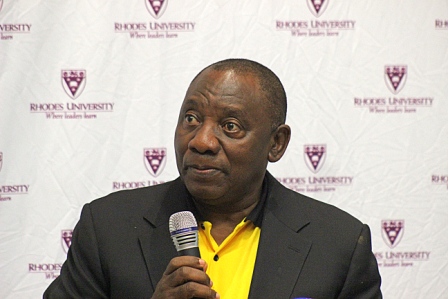Service delivery protests reflect severe weaknesses in local governance, poor consultation with communities and a perceived distance between communities and their public representatives, says President Cyril Ramaphosa. He said the government had adopted a multi-disciplinary and systemic approach to tackle service delivery protests.
The President was fielding oral questions in the National Assembly on Tuesday in response to a question from United Democratic Movement (UDM) President Bantu Holomisa. Holomisa had asked the President whether he had any plans to coordinate the entire government machinery to visit affected communities to present them with detailed responses to their concerns.
“If we are to effectively address the causes of community protests and improve the conditions under which people in these communities live, it is necessary to proceed in a systematic manner,” Ramaphosa said. “It is necessary to ensure intergovernmental alignment since the issues at hand cut across national, provincial and local competencies.
“At the same time, it is necessary for public representatives – including MPs and Ministers – to engage with communities on an ongoing basis to ensure that their needs and concerns are being addressed.”
The President said reasons for community protests ranged from local service delivery failures to broader concerns around crime, municipal demarcation, corruption and failure of governance. He said most of these protests – both peaceful and those that turned violent – reflected the severe weaknesses in local governance, poor consultation with communities and a perceived distance between communities and their public representatives at all levels.
Ramaphosa said the government had established an inter-ministerial task team to enhance integrated planning, budgeting and implementation of service delivery programmes in 57 municipalities. These included the eight metropolitan municipalities, 43 local municipalities and six priority district municipalities.
“Together, these municipalities account for over 87% of all households living in informal settlements or backyard dwellings,” Ramaphosa said. “They also constitute over half of all service delivery backlogs and have the greatest number of recorded service delivery protests.
The Inter-Ministerial Task Team is being supported by a programme management office at the Municipal Infrastructure Support Agent (MISA), drawing directly on the MISA technical team of professional engineers and planners, as well as professionals from national and provincial sector departments. – SAnews.gov.za



